- Home
- Iain Banks
Canal Dreams Page 5
Canal Dreams Read online
Page 5
The ferry journey was smooth and for a long time she watched the wake the ship left stretching back to the dark island of her birth.
In the forbidding room in the old building near Yoyogi Park she played again; again the stern-looking men listened. Because her hands had healed, she could use them to tell the judges how much it had hurt when they were forced on to the rough metal of the radiator; how much she had been hurt; how much her mother had been hurt; how much everything hurt. They still looked stern but they gave her the bursary.
She wore the pollera and one of the mola blouses to the party on the Nadia, the third ship stranded in the lake. The Nadia was a general cargo vessel, registered in Panama itself, but Japanese-owned. Like the Nakodo, it had been crossing from Pacific to Atlantic when the canal was closed.
The Nadia's parties were held under an awning on an upper deck. It was a clear night for a change, and on the way over in the Nakodo's launch, heading for the bright patch of light and the sound of Latin music, she watched the stars, fabulous and strewn, arching across the sky above the darkness of the lake.
Philippe was already there, looking tall and fine and. tanned in his white dress uniform. She felt the way she always did when she saw him like this; afraid and embarrassed. Afraid that he would look at her one day and, instead of smiling (as he did now, coming forward, taking her hand, kissing it), scowling. She would know what that scowl meant; it would mean that he no longer wanted her, that he was wondering what he'd ever seen in her, what had possessed him to take this older woman, this small-breasted, unglamorous Japanese woman to his bed; that he was thinking how foolish, how blind he must have looked to everybody else, and how he could gracefully disengage from the association. So she searched his face for that look at almost every meeting, knowing the expression might be fleeting, knowing it might be almost invisibly brief, but sure she would recognise it when it came.
Her embarrassment was caused simply by the thought; what was she doing with this handsome young man?
'You are very ethnic tonight, Philippe said to her, looking her up and down as they went to the drinks table.
She made a flouncing movement with the pollera. 'And you look most dashing.
'But I expand, he patted his jacket over his belly. 'Too much of this. He nodded at the food and drink displayed on the tables under the awning.
She squeezed his hand. 'More exercise, she told him, then said hello to the steward at the drinks table, and asked for a Pernod.
'Do you want to dive tomorrow? Philippe asked her. 'We can dive at night, perhaps? The lights are ready. Philippe had wanted to dive in the lake at night for weeks, but didn't have any underwater lights apart from a couple of small torches. Viglain, the engineer on Le Cercle, had agreed to make some lights for them.
She nodded. 'Yes, let's do that. She raised her glass to his. Santé.
Santé.
Nobody had braved the journey from Frijoles, a few kilometres away down the canal towards the Pacific coast, or Gatún, about the same distance away in the direction of the Atlantic. Hisako spent a great deal of time dancing; the only other women there were the wife of Captain Bleveans — the Nadia's skipper — and Marie Boulard, Le Cercle's junior deck officer.
They sat down to eat; ceviche de corvina, tamales, carimañolas, lobsters and prawns. She passed on the chicharrones, small pieces of fried pork crackling.
She talked to Captain Bleveans; he'd been the only one of the people on the ships who'd known anything about her and her career before they met, though a few of the rest had at least heard of her. Bleveans had some of her more recent recordings, and she'd let him tape the two recitals she'd given since the ships were trapped.
On the other side of the table, Orrick and Broekman were arguing. Mandamus seemed to be reading Mrs Bleveans's hand. Philippe was talking to one of the Nadia's engineers; Endo was doing his best to converse with his opposite number on the ship.
She tried not to keep looking at Philippe all the time.
They'd first met at a similar party on his ship, Le Cercle. It had been less than a week since the closure of the canal. Captain Herval, the Nadia's captain, had suggested that the officers of the three ships have an informal gathering; passengers were invited too.
She'd been talking to Mrs Bleveans. The wife of the Nadia's captain was a tall, thin woman who always dressed well and. never appeared without subtle but obviously carefully applied make-up, but whose face, Hisako thought, looked faintly — if tastefully — dismayed, as though you were forever telling her something she really did not want to hear, but was not prepared to stoop to arguing about.
'Excuse me, Madame Bleveans.
Hisako turned to see the tall, dark-haired Frenchman looking first at Mrs Bleveans, then at her, smiling slightly. They'd been introduced; his name was Philippe Ligny. He nodded to the American woman and to her. 'Mademoiselle Onoda?
'Yes? Hisako said.
'There is a radio call for you. It is from Tokyo. A Mr… Morieur?
'Moriya, she said, amused at his accent.
'He says it is urgent. He waits. I can take you to the radio, yes?
'Yes, thank you, she said. 'My agent, she explained to Mrs Bleveans.
'Mr ten percent, huh? Well, give him hell, honey.
Hisako followed the young Frenchman through the ship, admiring his back, imagining the feel of those shoulders under her hands, and telling herself she might have had too much wine. 'Ah, an elevator! she said. Philippe motioned her to enter the small lift first.
'We are very… decadent on ships todays, he told her, following her in and pressing the top button. She smiled at the 'todays', then told herself his English was ten times better than her French. They had to stand with arms touching. She felt awkward, standing so close to him. He smelled of an aftershave or cologne she could not identify. The lift hummed around them, sending vibrations up her legs. She cleared her throat, wanting something to say, but couldn't think of anything.
'The radio; is just like a téléphone. He held out the handset for her while she sat in the chair just vacated by the radio operator. The wall ahead of her was packed with small screens, lights, dials and buttons; there were another couple of telephone-type handsets, plus two other microphones.
'Thank you.
'I will be forward, on the bridge? He pointed; she nodded. 'When you finish, you hang the… the piece here.
She nodded again. She could already hear the squeaky voice of Mr Moriya coming from the receiver in her hand. Philippe Ligny closed the door behind him, and she sighed, wondering what Mr Moriya thought important enough to track her down here.
'Hisako?
'Yes, Mr Moriya?
'Look, I've had an idea; supposing I hired a helicopter…
Mr Moriya retired defeated after about ten minutes, mollified by the information that the canal authorities hoped to have the canal operating within a few days. She left the radio room (it smelled of… electronics, she thought to herself) and went down a short corridor to the red-lit bridge, where more tiny lights winked.
The bridge was very long (or wide, she supposed), and full of even more complicated equipment than the radio room; multifarious surfaces, levers, buttons and screens glinted in the strange ruby glow coming from the overhead lamps. The bridge's sloped windows looked out over the dark lake to the lights of the Nakodo, a kilometre away, and beyond that she could make out what must be the lights of Gatún, normally obscured by the various small islands between the town and the buoy-field where the ships lay moored.
She went to the ship's wheel; it was small; about the size of a sport's car's. She touched it.
'Not bad news, no?
She jumped a little (and thought at least her blush would go unnoticed in this ruby light), and turned to Ligny, who'd come from another red-lit room just off the bridge.
She shook her head. 'No. My agent is worried; I am due to play in Europe in two weeks, and- she spread her hands - well, I will be late, I suppose.
'Ah. He no
dded slowly, looking down at her. His face was smooth-looking and somehow theatrical under the red lights. She expected the usual questions — Why hadn't she flown? Would she be going to his country? — and so on, but he just looked slowly away. She noticed he was holding a clipboard. He glanced at it. 'Excuse me, he said. 'I will call one of the men to take you back; I stay… it is my watch.
'I can find my own way back, she said.
'Bien.
'I was just… she looked around, at the banks of controls and screens, … admiring all this machinery. So complicated.
He shrugged. She watched his shoulders move. 'It is… more simple than it looks. The ship is… like an instrument. I think a violoncelle is more difficult perhaps.
She found herself shrugging too, realising halfway through the action she was unconsciously imitating him. 'But there are only four strings on a violoncelle, she said. 'And one person can work it, not… twenty or thirty.
'But… one person can work the ship, he said. He motioned at the expanse of controls. 'We control the engine from here direct; this is the wheel; there is radar, echo sounder… the ah… machine for the anchor; we have computers and satellite location as well as paper charts… of course, in reality- (He said realité; she decided she could listen to his accent for hours; days.) "- you need many more people… for maintenance… so on.
She wanted to extend the moment, so moved along the edge of the controls sloped beneath the windows. 'But there's so much; so many controls. She felt a little guilty at acting the ignorant female, but then although Officer Endo had shown her round the bridge of the Nakodo, she hadn't paid all that much attention. She ran her hand over one set of blank screens. 'What does this do, say?
'Those are monitors; televisions. So that we can see the bows, stern, so on.
'Ah. And these? Was she being too obvious, running her fingers along the levers? This was silly, really. There was a very attractive young woman officer on this ship, much better looking than her. But what was wrong with flirting? She wasn't even really flirting, anyway. Probably he hadn't noticed; she was being over-sensitive.
'Pumps; to pump the cargo; the oil. And here… controls for fighting fire. Foam; water sprays.
'Ah ha. So, you carry… crude oil? She folded her arms.
'Yes. From Venezuela. We take it to Manzanillo, in Mexico… on the Pacific coast.
'Ah yes. You were going in the other direction.
He smiled. 'And so we meet.
'Indeed, she smiled back. He kept looking at her. She wondered how long she could keep up this eye contact.
'When I was young, he said slowly.
'Yes? She leant back a little, backside against the lip of the control deck.
'I was… I had to play the violon… violin. I tried the… how do you say violoncelle?
'Cello.
'Cello, he said, smiling. 'I tried the cello, but I was not very good. I was just a little boy, you know?
She tried to imagine him as a little boy.
'Your cello is Stradivari? he said. He looked a little more boyish when he frowned. She nodded. Just keep speaking, you beautiful man, she thought. And: What am I doing? This is absurd. What age am I supposed to be?
'I thi — I thought he made violons only.
'No, cellos too. Him, and his sons.
'It is very good… cello, then.
'Well, I like the sound it makes. That's the most important thing. Inspiration! 'Would you like to… she gulped. 'Would you like to… to play it?
He looked shocked. 'Oh no; I could not. I might hurt… I might damage it.
She laughed. 'Oh, it's not so easily damaged. It looks delicate but really… it's strong.
'Ah.
'If you would like to play it… if you can remember. Please do. I'd like you to. I could give you lessons, if you like.
He looked almost bashful. She thought she could see him as a little boy, just perhaps. He looked down at the deck. 'I would be… is too kind of you.
'No; I'm going to Europe to play, but also to teach. I must practise to teach as well as to play.
He was still looking bashful. The tiny frown was there too. She wondered if she was being too obvious. 'Well… he said. 'Perhaps… could I pay you?
'No! She laughed, and bent at the waist, bringing her head briefly near him. She shook her head quite hard, knowing it made her collar-length hair flare out. What am I doing? Oh please don't let me make a fool of myself 'I know, she said. She. looked down the length of the bridge. 'We'll trade. You could teach me how to work the ship.
It was his turn to laugh. He waved the clipboard in the same direction she'd looked. 'Is… not really so much, not moored here. If you like, I show you but…
'Is there anything else you could teach me? As soon as she'd said it she wanted to close her eyes and run away. She heard herself suck air in through her teeth.
'Have you ever… dived? With the… ah, aqualung?
'Dived? No.
'I could perhaps teach you that. I have a… a système, yes? And there is another, for the ship. I can ask Capitaine Herval; I think he would let you use that. Is a good trade? His smile showed perfect teeth.
She nodded, put out her right hand, suddenly bold. 'Yes. A good trade.
They shook on it. His hand was large and strong and cool, and he looked surprised when she met his grip with one just as firm and sure.
'That's complete crap.
'Perhaps, Mandamus agreed generously with Orrick. 'But it's an idea, if not a new one. Saying "that's complete crap" isn't even an idea. It's just an opinion. What is your idea?
'I just can't believe you can be so pessimistic and… and still be alive. Jeez, if I felt that way I think I'd kill myself.
'It's not pessimism, Mandamus said. 'It's what I call the Bleak View, but it isn't pessimism. If it's right it's right. Truth is truth; I am old-fashioned in that regard. But I believe as I say; we are like a cancer. To be like a cancer in one way may be no bad thing; we live and grow. The question is how much we resemble cancer in any other way. If-
'Just because we're smart? Is that what you're saying? Just being smart makes us bad? That's crazy.
'You don't listen; the smartness-
'I'm listening, I just don't believe what I'm hearing.
'You must have heard of Gaia; the planet as organism. Well, we are the cancer in its body. Do you understand that? We were like an ordinary organ, once; part of the whole. We lived and died, we behaved ourselves like cells, existing and being replaced, just another species, preying on some species, preyed on by others… whether we lived or died as a species made little difference. Then; phut! Intelligence. Mr Mandamus snapped his fingers. The younger man shook his head, drank from his beer bottle. The others were keeping quiet; even Broekman, who was sitting back in his chair looking tired and smoking a cigar, his collar undone.
Hisako glanced at Philippe, who winked at her.
'And with that, Mandamus said. 'everything changes. We invent ways to blow up the world, but before that we start destroying other species; the other organs of the Gaia body. And we change her body. Oh, shake your head, Steven, but come with me to Alexandria; come to Venice. Alexandria becomes Venice, Venice Atlantis. The waters are rising; the ice is melting and the waters are rising. What we do means everything now. Whether we survive or not matters not just to us but to all the other species we take down with us if we go under. Because we have the drives of any species; to live, to breed, to spread. But we have this extra thing, this consciousness nothing else has.
'Yeah, what about whales?
'Fah; if they were so smart they wouldn't let us kill them so easily. They'd post look-outs, they'd avoid all ships, or ships smaller than a certain size, or ships that turn towards them, or —
'Maybe they are. Maybe some of them are but we just can't —
'No; they can't hide from satellites, Mandamus said quickly; and made a motion as though brushing this aside. 'But there we are; whales are intelligent, for animals; they
are big, they are impressive and beautiful… but we kill them, we make them extinct because there is money in it, because we've made it easy; because we can. So we spread ourselves, and kill everything else. Only our intelligence lets us do this; it is what takes us beyond the «stop» message all other species have; they are limited by their specialisation, by the adaptation they have made to fit their niche. We take our niche with us; even into space. Thus we threaten to metastasise.
'So we're just doing what we're supposed to do', Orrick said. 'And if we kill off other species maybe they should have been smarter. It's the smart survive; it isn't our fault if we're too smart for anybody else.
Mandamus made a spluttering noise, and drained the rum he'd been drinking, shaking his head and wiping his mouth. 'Young man-
'Christ, said Broekman.
They looked at him. He came tipping forward on his seat, its front legs thudding into the deck. Those on that side of the table were following his gaze. Hisako turned with the others. The sky to the west was flickering with silent blue-white bursts of light. Silhouetted against the unsteady flarings were the hills on the west side of the lake. The underbellies of the clouds snapped in and out of view with the fierce strobing of the light, like folds of cloth hung in some vast hall. Half the horizon glittered and danced. Gatún Lake reflected it all, a distorted mirror held up to the edge of the sky gone crazy. The outline of Le Cercle sat upon the livid image like a toy.
'What the fuck is that? Orrick breathed.
'L — language, Mr Mandamus said, absently but shakily. 'Is it just… lightning?
Points of flame appeared beneath the clouds; they blossomed and spread like vast slow fireworks, rubbing an unnatural sunlight on to the sagging undersurfaces of the clouds, then falling in a thousand curved yellow streaks towards the ground. Arcing coruscations flicked to and fro across the sky, winking out or disappearing in the clouds like red and silver sparks.

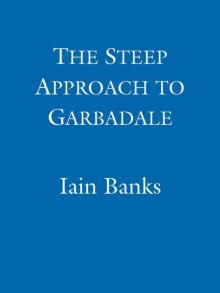 The Steep Approach to Garbadale
The Steep Approach to Garbadale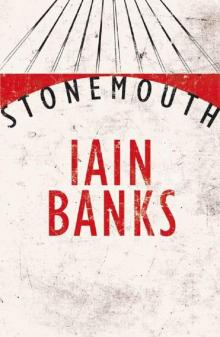 Stonemouth
Stonemouth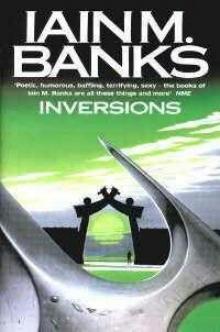 Inversions c-6
Inversions c-6 Raw Spirit: In Search of the Perfect Dram
Raw Spirit: In Search of the Perfect Dram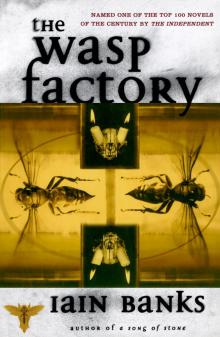 The Wasp Factory
The Wasp Factory Raw Spirit
Raw Spirit Walking on Glass
Walking on Glass Espedair Street
Espedair Street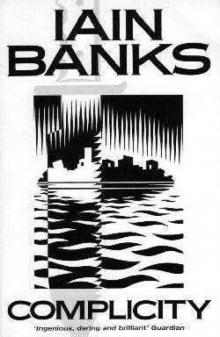 Complicity
Complicity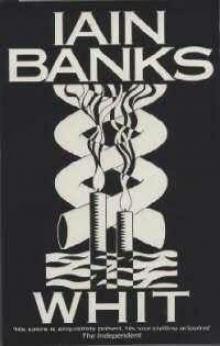 Whit
Whit Dead Air
Dead Air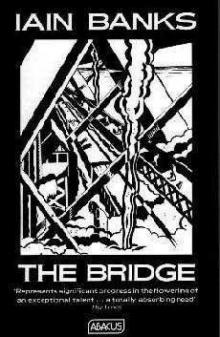 The Bridge
The Bridge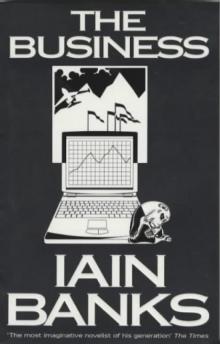 The Business
The Business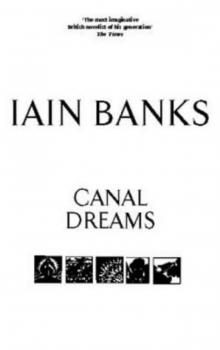 Canal Dreams
Canal Dreams The Crow Road
The Crow Road